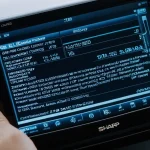British Computing Origins and Landmark Innovations
British computing history is rich with pivotal moments that shaped today’s technology landscape. At its core lies Alan Turing’s groundbreaking concept of the Turing machine, which formalized the principles of computation. This theoretical model laid the foundation for modern computers by defining how algorithms could be executed mechanically—a revolutionary idea still central to computer science.
During World War II, British inventiveness shone at Bletchley Park, where engineers developed Colossus, the world’s first programmable electronic digital computer. Colossus cracked complex German codes, demonstrating practical computing’s powerful potential. This not only contributed to Allied victory but also propelled computing development forward.
Also to read : What role does fintech play in the UK computing landscape?
The impact of British inventions extends globally. The foundational frameworks laid by early machines and algorithms influenced subsequent computer designs internationally. British innovations infused both academic theory and practical engineering, enabling the rapid evolution of computing technology worldwide. The British computing history embodies a rare combination of intellectual rigor and pragmatic problem-solving that continues to resonate throughout global technology advancements.
Transformative Contributions: Influencing Modern Technology
British computing history continued its influential trajectory with Tim Berners-Lee’s creation of the World Wide Web in 1989. This innovation fundamentally transformed global communication by enabling easy access to information across diverse networks. Berners-Lee’s invention laid the groundwork for the interconnected digital landscape we rely on today.
Additional reading : Discover how british innovations are shaping the future of computing
Alongside software breakthroughs, British inventors contributed significantly to hardware development. Companies such as Sinclair and Acorn pioneered early home computers, making technology more accessible to the general public. These devices helped seed personal computing in homes and schools, accelerating digital literacy.
British computing history also shaped the adoption of crucial protocols and systems worldwide. The influence of British tech standards extended into networking methods and programming languages, supporting global technology integration. These contributions highlight the UK’s role not only as an originator of ideas but also as a driver of widespread global technology adoption.
Together, British tech influence, both in software and hardware, has been instrumental in shaping the modern digital era—bridging innovation and practical application with lasting international impact.
British Computing Origins and Landmark Innovations
British computing history is deeply rooted in the pioneering work of Alan Turing and his development of the Turing machine. This theoretical construct defined the principles of mechanical computation, setting a framework for algorithm execution that remains fundamental in computer science. The clarity and precision of Turing’s model allowed later inventors to build more complex machines, firmly establishing British computing history as a cornerstone for modern technology.
Another landmark was the creation of Colossus at Bletchley Park during World War II. As the world’s first programmable electronic digital computer, Colossus not only deciphered complex enemy communications but also demonstrated the practical power of computing technology. This historic invention represents a critical moment where British inventions impact extended well beyond academic theory into real-world applications.
The foundation laid by these innovations fueled British computing’s continued influence on global technology. From early theoretical models to tangible machines, the UK’s contributions created a ripple effect, shaping the design of computers across nations. This enduring legacy underscores how British computing history has driven progress internationally.
British Computing Origins and Landmark Innovations
British computing history is distinguished by foundational breakthroughs that continue to influence technology globally. The Turing machine, conceptualized by Alan Turing, is a critical early breakthrough. It defined computation abstractly, demonstrating how machines could perform complex tasks mechanically. This model remains essential in theoretical computer science and guides modern algorithm development.
During World War II, the development of Colossus at Bletchley Park showcased the practical impact of British inventions. As the world’s first programmable electronic digital computer, Colossus cracked encrypted communications, highlighting the power of computing in real-time problem-solving. This success underscored how British computing history bridges abstract theory and practical implementation.
The British inventions impact extends beyond these milestones. The principles established by Turing and the computational capabilities demonstrated by Colossus laid a foundation that inspired global computer design and technology standards. Their legacy evidences how British computing history forms a cornerstone for international tech progress and innovation.
British Computing Origins and Landmark Innovations
British computing history begins with Alan Turing’s Turing machine, an early breakthrough conceptualizing mechanical computation. This abstract model precisely defined how algorithms could be executed step-by-step, laying a lasting theoretical foundation for computer science. The Turing machine remains central to understanding computational limits and capabilities.
During World War II, British inventions impact was clearly seen at Bletchley Park, where the Colossus computer emerged as the world’s first programmable electronic digital machine. Colossus was pivotal in decrypting German communications, showing the practical power of computing beyond theory. This marked one of the earliest uses of computers for real-time problem-solving in critical situations.
The influence of British computing history extends globally. The principles behind the Turing machine and the success of Colossus shaped subsequent computer architectures worldwide. These innovations offered both conceptual groundwork and proven applications, positioning British computing history as a cornerstone in the evolution of modern technology. The British inventions impact fostered global technological progress, blending deep theory with pragmatic engineering.







